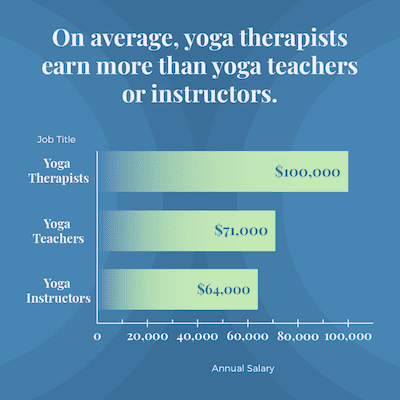
Yoga therapy is a specialized career path in yoga that is steadily growing. Yoga therapist jobs aren’t as common as talk therapist or physical therapist jobs, but they have a similar goal in mind. The goal of yoga therapy is to reduce, eliminate, or manage symptoms of suffering, whether it be physical or mental.
Pursuing a yoga therapy career is a rewarding life path for many. Yoga therapy jobs allow individuals to assist in others’ healing processes. Many students wonder where yoga therapists work, how many jobs are available, and what kind of job opportunities there are in yoga therapy.
I’ll share my experience and observations about what types of yoga therapy jobs are out there, average salary ranges, opportunities to advance your career, and how to get started with training to become a yoga therapist. Read on to learn why a career in yoga could be right for you!
Table of Contents:
“Where do yoga therapists work?” is a common question that we get from prospective students at Breathing Deeply, and it’s something that we discuss and advise about throughout our yoga therapy training programs.
It’s not uncommon for yoga therapists to work two or three part-time jobs, such as having a private practice in addition to working at a hospital, addiction center, or other public setting. Some yoga therapists also supplement their work by teaching a yoga class in addition to running a private practice for yoga therapy.
To give you an overview, watch my video below and keep reading for a few of the most common yoga therapist jobs that students can pursue after completing their training.
For years, the primary way to earn a living as a yoga therapist was to be in private practice, as yoga therapy clinics are not common. At a private practice, a yoga therapist typically works alone without other partners. There are usually few to no support staff members.
For those who want to manage their own business and control how they work with clients, a yoga therapy career at a private practice can give you the independence, freedom, and close client relationships you’re looking for. As with anyone starting a business, it requires an entrepreneurial spirit and the time and skills to manage your own practice.
In the past and still today, yoga therapists often have specialties within the field. This is a great way to not only follow your passion for a specific niche, but also make your skills more valuable. Having one or two specialty areas allows you to truly become an expert, increasing your ability to draw clients, build a practice, and establish a reputation. Many yoga therapists work alone as experts in yoga techniques for physical issues, mental health issues, chronic diseases, or even a specific disease or pathology.
If you develop enough of a clientele, your private practice could be your full-time yoga therapy job. As you’re establishing your practice, however, it is very common to also look for yoga therapist jobs near you in a hospital, center, or other public setting.
Many yoga therapists run their own practice while also working at a hospital, mental health department, addiction center, chiropractor office, school district, or other organizations part-time. Others choose to offer yoga therapy in a private practice while also teaching yoga classes, either at their own yoga studio or for another studio or institution.
Yoga therapists who run their own private practices have a wide range of fees they charge. Our general impression is that a yoga therapist’s salary is in the range of other alternative healthcare providers, with the current national average yoga therapist salary at $70,000, according to ZipRecruiter.

Of course, there are numerous factors that go into determining the salary for yoga therapist jobs, including:
Location: In major cities where the cost of living and demand for yoga therapy may be higher, a yoga therapist may charge clients upwards of $100 per hour. In smaller cities, yoga therapists often charge less.
For more information and data, read our guide to yoga therapist salary.
Now that yoga therapy is gaining acceptance with the public and with more integrative healthcare providers, we are seeing job opportunities for yoga therapists emerge outside of private practice. There are also nurses, physical therapists, occupational therapists, mental health professionals, social workers, and other healthcare professionals who get yoga therapy training and bring it into these careers.
We have seen yoga therapists from our school employed at:
Hospital programs (such as cancer centers)
Mental health departments
The V.A. for trauma-sensitive classes
Addiction centers
Chiropractors’ offices
Wellness centers
School districts
The United States Department of Veteran Affairs, which is the largest hospital system in the U.S., in particular has become very active lately in incorporating yoga therapy into the V.A.’s offerings. Yoga therapist jobs in hospital settings can mean working in a department of a hospital, such as a cancer center or mental health department, or at a hospital-owned practice.
Some yoga therapist jobs at centers and public institutions involve working one-on-one with clients, while others may involve running group sessions for specific condition sets. Particularly at a hospital or other large organization with multiple departments, your yoga therapy services may be used on their own or as part of a holistic wellness treatment plan in conjunction with other healthcare practitioners.
These jobs tend to offer more stability for a yoga therapy career, with predictable income, an established patient base, and regular hours. However, you have less control over work policies and the services you provide. While you may find full-time work in one of these settings, it is more common to find part-time yoga therapy jobs.
Developing areas of expertise can help advance your career if they align with the hospital, center, or public setting where you’re employed. For example, specializing in yoga therapy for cancer could make you a more attractive candidate for a yoga therapist job in a hospital’s cancer department. By contrast, specializing in mental health generally or in a specific condition, such as depression, could help advance your career as a yoga therapist at a mental health center.
These opportunities at various centers are usually paid hourly. They also are not usually full-time positions. A yoga therapist working for a wellness center or in the public health sphere can expect to make anywhere from $25 to $120 per hour.

As with private practice yoga therapy jobs, the salary you earn will depend on a number of factors, including:
Skill Level: Certain positions require yoga therapy certification, which can earn you more. On average, yoga therapists earn slightly more than yoga teachers or instructors in the U.S., as shown in the data above from ZipRecruiter. If you develop areas of expertise that are in demand, you may be qualified for higher paying positions. For example, specializing in yoga therapy for trauma and PTSD could make it easier to get hired and advance your yoga therapy career at the V.A.
For more information and data, read our guide to yoga therapist salary.
In my years as a yoga therapist myself and helping new yoga therapists train and start their careers, I have seen all of these types of public positions advertised for, which is very encouraging.
I’ve trained students who have gone on to find yoga therapist jobs at the V.A., in other hospital settings, in school systems, at mental health facilities, at addiction centers, and more. I once saw a job listing for the U.S. Capitol Police, which was over $100K per year. One former student found work at an addiction center full-time, getting paid by the hour, which I hadn’t seen before.
The fact that institutions and healthcare practices know to ask for a yoga therapist is a sign that the field is moving forward and that more and more job opportunities for yoga therapists are coming. One area where it’s still challenging to find a job is as a professor teaching yoga therapy at the university level, given the small number of master’s programs in yoga therapy available.
To get an idea of how many yoga therapy jobs are near you, you can look at job search sites such as Indeed, Monster, Glassdoor, SimplyHired, ZipRecruiter, and more, as well as look for opportunities with specific centers or hospitals, such as the V.A..
As of this writing, there were a range of jobs for yoga therapists listed on these sites, including:
In the health and wellness field, a scope of practice outlines the actions, procedures, and processes that a licensed healthcare practitioner is allowed to perform based on the laws and regulations in place. As an international leader in yoga therapy that offers the highest form of yoga therapy certification, the International Association of Yoga Therapists (IAYT) has created a scope of practice for yoga therapy.
The IAYT scope of practice gives certified yoga therapists a scope of practice to follow in their yoga therapy career, and it gives other healthcare practitioners and the public a frame of reference to understand what yoga therapists are qualified to do and how their work fits into the healthcare field. According to the IAYT scope of services, yoga therapy can occur in one-on-one sessions as well as in group sessions, where a yoga therapist works with a small group of clients who have similar or varied symptoms or health conditions.
A few key things to keep in mind about what a yoga therapist is qualified to do include:
Identifying risk factors or contraindications
A few key things to keep in mind about what a yoga therapist is not qualified to do include:
Interpreting raw medical or psychological diagnostic test results (unless you are also a licensed healthcare practitioner qualified to do so)
Prescribing medication (unless you are also a licensed healthcare practitioner qualified to do so)
Prescribing supplements or herbs (unless you are also qualified to do so)
In addition, yoga therapists must maintain their certification, qualifications, and ongoing continuing education requirements, as well as maintain client confidentiality, comply with the IAYT Code of Ethics and Professional Responsibilities, and follow all relevant state or local jurisdiction laws.
The yoga therapy job market outlook is positive, and career opportunities in the field of yoga therapy are expanding beyond just private practice. As yoga therapy becomes more popular and its healing effects better understood, more yoga therapist jobs are being created at public entities like wellness centers and school districts.
The most encouraging news is that Breathing Deeply is now receiving referral inquiries from healthcare providers for names of yoga therapists. These employers are having trouble filling the yoga therapy positions they have available, providing more exciting job opportunities for our students.
This makes a lot of sense considering how much the field of yoga therapy is gaining recognition and popularity, while the International Association of Yoga Therapists (IAYT) has roughly only 1,000 yoga therapists in the U.S. holding their certification (C-IAYT).
I see this moment as a very exciting time to enter this emerging field early in its development as becoming a “profession.” I am honored to be an integral part of this new paradigm in wellness by sharing the mission to spread the availability of quality, practical, and ethical yoga therapy.
Are you ready to be a change-maker in this emerging field of yoga therapy? You may be asking yourself, “What’s next? How do I train to be a yoga therapist?”
Pursuing a career in yoga therapy is a worthwhile decision for anyone who wants to help people feel their best. At Breathing Deeply, we are committed to providing the training necessary for our students to become ethical, qualified yoga therapists.
Whether you’re just getting started or you’ve already completed your yoga teacher certification, we have a program to match your skill level. We provide the support students need with live Q&As, self-paced coursework with 24/7 access, flexible payment plans, and a thriving community of teachers and colleagues.
Start your journey on a new and exciting career path with Breathing Deeply IAYT-accredited courses. Learn more about our yoga therapy training courses or apply now. We look forward to working with you!
Brandt talks about common questions applicants have about the Breathing Deeply Yoga Therapy Program. Tune in to get the full program details.
Friends in Yoga, The way we perceive the world is a curious thing. Is it on fire or getting better? Are we facing our challenges or shying away from them? Are we functioning from the present or some altered reality based on past experiences? The teachings tell us that reality is ultimately timeless. The vibration […]
There’s no doubt that yoga is gaining popularity, but you may be asking yourself, what is the most popular type of yoga? Where is each type most popular in the U.S. and around the world? And for those who are interested in trying it themselves, how can you practice these styles of yoga safely? For […]
Friends in Yoga, Sitting on a cushion, taking a yoga class, chanting a mantra before your morning coffee…no one would call these radical acts. They are small choices that we make to better ourselves. The motivation to practice often takes form by our desire to be healthier, to be more focused, to connect with our […]